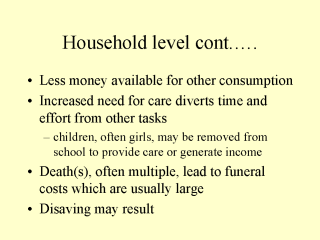| front |1 |2 |3 |4 |5 |6 |7 |8 |9 |10 |11 |12 |13 |14 |15 |16 |17 |18 |19 |20 |21 |22 |23 |24 |25 |26 |27 |28 |29 |30 |31 |32 |33 |34 |35 |review |
 |
As income is
reduced and diverted to health care needs, there is less money available for other
consumption. Households may resort to a number of responses to ensure food security,
maintain income and labour. For example, households may buy cheaper foods, rely on wild foods, beg, or call in social and familial obligations (sending children to stay with relatives). Households might also borrow money from the informal sector or relatives, sell assets or use up savings or investments to maintain an income. Children, especially girl children, may be removed from school to alleviate labour shortages, the size of cultivated areas may be reduced or relatives might be asked to help (calling in social and familial obligations once again). Some of these responses are less than ideal, for example the removal of children from schools to alleviate labour shortages may have long term repercussions for the individuals involved, while constant reliance on social and familial obligations may cause these bonds to break down. Disaving refers to the use of savings or selling off household assets. |